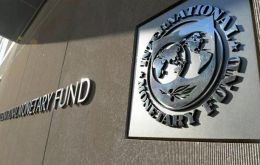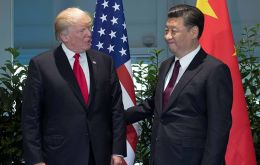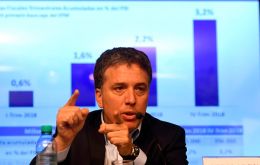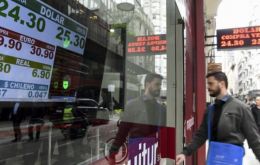MercoPress. South Atlantic News Agency
Tag: Gross Domestic Product (GDP)
-
Friday, July 18th 2025 - 10:07 UTC
Venezuela records GDP growth above 6% in 2Q of 2025

Venezuelan President Nicolás Maduro announced that his country's Gross Domestic Product (GDP) grew by over 6% in the second quarter of 2025, marking the 17th consecutive quarter of economic expansion, following a 9% increase in the first quarter of 2025. Maduro also highlighted previous growth figures of 9% in 2024, 5.5% in 2023, and a significant 15% in 2022.
-
Wednesday, April 16th 2025 - 19:13 UTC
Paraguay's GDP projections revised upwards

The Central Bank of Paraguay (BCP) has revised its 2025 GDP growth forecast upward from 3.8% to 4.0%, driven by stronger-than-expected economic activity in early 2025, BCP Chief Economist César Yunis explained. To reach these conclusions, the following issues were taken into consideration:
-
Tuesday, October 22nd 2024 - 20:49 UTC
IMF foresees prosperous 2024 for Paraguay

According to the International Monetary Fund's (IMF) “World Economic Outlook” report released Tuesday in Washington DC, Paraguay is the country in the region that will grow the most this year with a projected Gross Domestic Product (GDP) of 3.8%, way above South America's 1.8% average. Following Paraguay is Uruguay's 3.2% GDP, with Brazil, Peru, and Venezuela tied at 3%. Argentina ranks at the bottom of the list (-3.5%).
-
Thursday, December 27th 2018 - 21:59 UTC
Peru's GDP forecast to go up in 2019 thanks to private investment, domestic consumption

Peru's gross domestic product (GDP) is set to expand 3.7% this year and the next, boosted by the good performance of private investment and consumption, according to The Economist.
-
Tuesday, October 23rd 2018 - 08:53 UTC
Argentina's primary deficit falls to 1.1% of GDP, the lowest since 2012

Argentina's primary deficit fell to 1.1% of Gross Domestic Product (GDP) between January and September this year, compared to 2.1% over the same period in 2017, the Finance Ministry announced on Monday.
-
Saturday, October 20th 2018 - 08:37 UTC
Moody's cuts Italy's credit rating and EC warns over 2019 budget plans

Moody's has cut Italy's credit rating by a notch over concerns about plans for larger deficits and the high public debt load as the country's populist government clashes with Brussels over its budget. The European Commission formally warned Italy late Thursday that its budget plans for 2019 are a serious concern, launching a high-stakes process that could see Rome hit with unprecedented sanctions for breaking commitments to Brussels.
-
Tuesday, September 11th 2018 - 08:33 UTC
UK economy outperforms boosted by services and construction sectors

The United Kingdom economy bounced back in July as the services sector rebounded and construction output reached a record high. The Office for National Statistics (ONS) said the economy expanded 0.3% in July, while gross domestic product (GDP) rose 0.6% on a three-month basis.
-
Thursday, August 23rd 2018 - 08:48 UTC
Chile's GDP in the second quarter grew 5.3%

Chile's gross domestic product grew 5.3% in the second-quarter of 2018 compared with a year earlier, its biggest jump in nearly six years, the central bank said this week.
-
Wednesday, June 27th 2018 - 08:12 UTC
Argentine economy shrinks 0.9% as agriculture hit by drought plummets 31%

Argentina’s economy shrank in April for the first time in more than a year, government data showed on Tuesday, while the central bank held its policy rate stable at 40% in the first rate decision since a shakeup in its leadership.
-
Tuesday, April 24th 2018 - 08:42 UTC
Brazil poised for historic oil boom

By Mathew Smith<br />
<br />
After being caught up in major corruption scandals and suffering from what some have claimed was its worst economic downturn in 100-years, Brazil has pulled itself back from the brink. The economy commenced growing again in 2017 with gross domestic product (GDP) expanding by 1 percent and 2018 GDP growth forecast by the International Monetary Fund (IMF) to be 2.3%.
